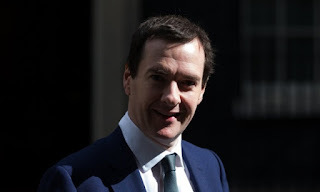The Institute for Fiscal Studies has warned that the government has given a misleading impression of the size of the cuts required for George Osborne to meet his pledge to balance the books over the next three years.
Carl Emmerson, the thinktank’s deputy director, said “unprotected” Whitehall departments – excluding the NHS, schools spending and overseas development – could face cumulative cuts of more than 15% over the next three years.
That would take spending in departments including the Home Office, Defence, and Communities and Local Government to 32.9% below 2010 levels, when the Tory-led coalition came to power.
The chancellor will give his first indication of spending plans in a summer budget on 8 July. Osborne’s most recent budget pointed to two years of sharp cuts, followed by a freeze in 2018-19 and a rise in 2019-20 – a government spending profile the independent Office for Budget Responsibility described as a “rollercoaster”.
On Wednesday, the Paris-based thinktank the Organisation for Economic Cooperation and Development urged the chancellor to smooth the path of planned cuts or risk jeopardising growth.
While David Cameron has stressed that the planned spending squeeze means saving just £1 in every £100 the government spends, Emmerson said the claim “seriously underestimates the size of the challenge we face”.
“While not inaccurate, these numbers give a misleading impression of what departmental spending in many areas will look like if the manifesto commitment to eliminate the deficit by 2018–19, largely through spending cuts, while not cutting spending in many areas, is to be met,” he said.
Speaking in London at an event organised by the Institute for Government, Emmerson also listed several reasons this round of cuts is likely to be more challenging than those implemented over the 2010-15 parliament.
Britain’s debt repayments are expected to increase; its ageing society is creating rising pressures on the NHS; and many of the simplest efficiency savings have already been made in the past five years, making it harder to identify new cuts.
A public spending squeeze is also likely to become harder to maintain now that wages in the private sector are starting to rise, the IFS warned. The thinktank also pointed out the difficulties facing Osborne if he is to achieve the planned £12bn savings from the welfare bill over the next two years, only 10% of which has so far been detailed.
Cameron’s pre-election promise to protect child benefit, which he has reiterated after last month’s general election, implies deeper cuts to other key benefits, Emmerson said.
Citing some examples of the options remaining to the chancellor, once pensions and child benefit are protected, the IFS deputy director said it was hard to identify simple, uncontroversial cuts.
Reducing the child element of working tax credits would net the Treasury £5bn in savings, for example – but it could plunge an extra 300,000 children into poverty. Taxing disability benefits would save £1.5bn, but would be hugely controversial with charities and campaigners.
theguardian.com
Carl Emmerson, the thinktank’s deputy director, said “unprotected” Whitehall departments – excluding the NHS, schools spending and overseas development – could face cumulative cuts of more than 15% over the next three years.
That would take spending in departments including the Home Office, Defence, and Communities and Local Government to 32.9% below 2010 levels, when the Tory-led coalition came to power.
The chancellor will give his first indication of spending plans in a summer budget on 8 July. Osborne’s most recent budget pointed to two years of sharp cuts, followed by a freeze in 2018-19 and a rise in 2019-20 – a government spending profile the independent Office for Budget Responsibility described as a “rollercoaster”.
On Wednesday, the Paris-based thinktank the Organisation for Economic Cooperation and Development urged the chancellor to smooth the path of planned cuts or risk jeopardising growth.
While David Cameron has stressed that the planned spending squeeze means saving just £1 in every £100 the government spends, Emmerson said the claim “seriously underestimates the size of the challenge we face”.
“While not inaccurate, these numbers give a misleading impression of what departmental spending in many areas will look like if the manifesto commitment to eliminate the deficit by 2018–19, largely through spending cuts, while not cutting spending in many areas, is to be met,” he said.
Speaking in London at an event organised by the Institute for Government, Emmerson also listed several reasons this round of cuts is likely to be more challenging than those implemented over the 2010-15 parliament.
Britain’s debt repayments are expected to increase; its ageing society is creating rising pressures on the NHS; and many of the simplest efficiency savings have already been made in the past five years, making it harder to identify new cuts.
A public spending squeeze is also likely to become harder to maintain now that wages in the private sector are starting to rise, the IFS warned. The thinktank also pointed out the difficulties facing Osborne if he is to achieve the planned £12bn savings from the welfare bill over the next two years, only 10% of which has so far been detailed.
Cameron’s pre-election promise to protect child benefit, which he has reiterated after last month’s general election, implies deeper cuts to other key benefits, Emmerson said.
Citing some examples of the options remaining to the chancellor, once pensions and child benefit are protected, the IFS deputy director said it was hard to identify simple, uncontroversial cuts.
Reducing the child element of working tax credits would net the Treasury £5bn in savings, for example – but it could plunge an extra 300,000 children into poverty. Taxing disability benefits would save £1.5bn, but would be hugely controversial with charities and campaigners.
theguardian.com

No comments:
Post a Comment